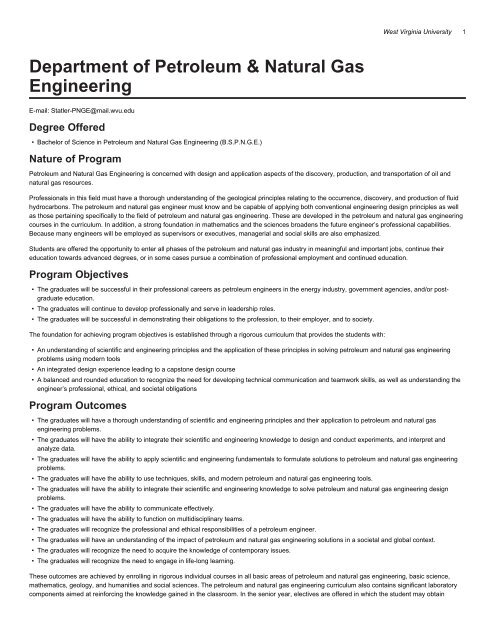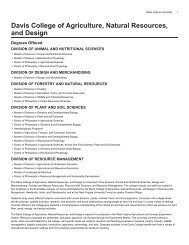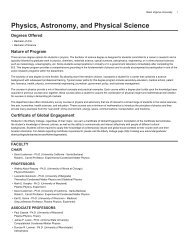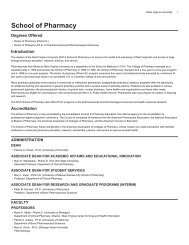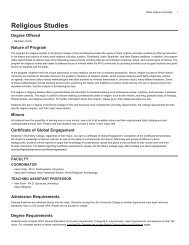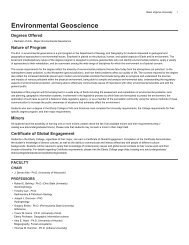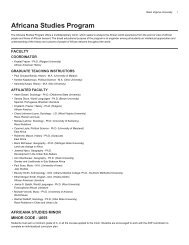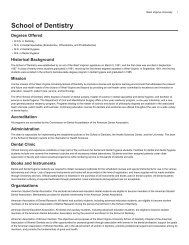Department of Petroleum & Natural Gas Engineering - West Virginia ...
Department of Petroleum & Natural Gas Engineering - West Virginia ...
Department of Petroleum & Natural Gas Engineering - West Virginia ...
Create successful ePaper yourself
Turn your PDF publications into a flip-book with our unique Google optimized e-Paper software.
<strong>West</strong> <strong>Virginia</strong> University 1<br />
<strong>Department</strong> <strong>of</strong> <strong>Petroleum</strong> & <strong>Natural</strong> <strong>Gas</strong><br />
<strong>Engineering</strong><br />
E-mail: Statler-PNGE@mail.wvu.edu<br />
Degree Offered<br />
• Bachelor <strong>of</strong> Science in <strong>Petroleum</strong> and <strong>Natural</strong> <strong>Gas</strong> <strong>Engineering</strong> (B.S.P.N.G.E.)<br />
Nature <strong>of</strong> Program<br />
<strong>Petroleum</strong> and <strong>Natural</strong> <strong>Gas</strong> <strong>Engineering</strong> is concerned with design and application aspects <strong>of</strong> the discovery, production, and transportation <strong>of</strong> oil and<br />
natural gas resources.<br />
Pr<strong>of</strong>essionals in this field must have a thorough understanding <strong>of</strong> the geological principles relating to the occurrence, discovery, and production <strong>of</strong> fluid<br />
hydrocarbons. The petroleum and natural gas engineer must know and be capable <strong>of</strong> applying both conventional engineering design principles as well<br />
as those pertaining specifically to the field <strong>of</strong> petroleum and natural gas engineering. These are developed in the petroleum and natural gas engineering<br />
courses in the curriculum. In addition, a strong foundation in mathematics and the sciences broadens the future engineer’s pr<strong>of</strong>essional capabilities.<br />
Because many engineers will be employed as supervisors or executives, managerial and social skills are also emphasized.<br />
Students are <strong>of</strong>fered the opportunity to enter all phases <strong>of</strong> the petroleum and natural gas industry in meaningful and important jobs, continue their<br />
education towards advanced degrees, or in some cases pursue a combination <strong>of</strong> pr<strong>of</strong>essional employment and continued education.<br />
Program Objectives<br />
• The graduates will be successful in their pr<strong>of</strong>essional careers as petroleum engineers in the energy industry, government agencies, and/or postgraduate<br />
education.<br />
• The graduates will continue to develop pr<strong>of</strong>essionally and serve in leadership roles.<br />
• The graduates will be successful in demonstrating their obligations to the pr<strong>of</strong>ession, to their employer, and to society.<br />
The foundation for achieving program objectives is established through a rigorous curriculum that provides the students with:<br />
• An understanding <strong>of</strong> scientific and engineering principles and the application <strong>of</strong> these principles in solving petroleum and natural gas engineering<br />
problems using modern tools<br />
• An integrated design experience leading to a capstone design course<br />
• A balanced and rounded education to recognize the need for developing technical communication and teamwork skills, as well as understanding the<br />
engineer’s pr<strong>of</strong>essional, ethical, and societal obligations<br />
Program Outcomes<br />
• The graduates will have a thorough understanding <strong>of</strong> scientific and engineering principles and their application to petroleum and natural gas<br />
engineering problems.<br />
• The graduates will have the ability to integrate their scientific and engineering knowledge to design and conduct experiments, and interpret and<br />
analyze data.<br />
• The graduates will have the ability to apply scientific and engineering fundamentals to formulate solutions to petroleum and natural gas engineering<br />
problems.<br />
• The graduates will have the ability to use techniques, skills, and modern petroleum and natural gas engineering tools.<br />
• The graduates will have the ability to integrate their scientific and engineering knowledge to solve petroleum and natural gas engineering design<br />
problems.<br />
• The graduates will have the ability to communicate effectively.<br />
• The graduates will have the ability to function on multidisciplinary teams.<br />
• The graduates will recognize the pr<strong>of</strong>essional and ethical responsibilities <strong>of</strong> a petroleum engineer.<br />
• The graduates will have an understanding <strong>of</strong> the impact <strong>of</strong> petroleum and natural gas engineering solutions in a societal and global context.<br />
• The graduates will recognize the need to acquire the knowledge <strong>of</strong> contemporary issues.<br />
• The graduates will recognize the need to engage in life-long learning.<br />
These outcomes are achieved by enrolling in rigorous individual courses in all basic areas <strong>of</strong> petroleum and natural gas engineering, basic science,<br />
mathematics, geology, and humanities and social sciences. The petroleum and natural gas engineering curriculum also contains significant laboratory<br />
components aimed at reinforcing the knowledge gained in the classroom. In the senior year, electives are <strong>of</strong>fered in which the student may obtain
2 <strong>Department</strong> <strong>of</strong> <strong>Petroleum</strong> & <strong>Natural</strong> <strong>Gas</strong> <strong>Engineering</strong><br />
additional depth <strong>of</strong> knowledge in specific areas <strong>of</strong> petroleum and natural gas engineering technology. Each student is individually assisted in course<br />
selection by an advisor who is a member <strong>of</strong> the petroleum and natural gas engineering faculty.<br />
Students gain practical experience and first-hand knowledge <strong>of</strong> many aspects <strong>of</strong> petroleum and natural gas engineering through close proximity to the<br />
industry in <strong>West</strong> <strong>Virginia</strong> and surrounding states. Production sites, secondary and enhanced oil recovery projects, compressor stations, gas storage<br />
fields, and corporate <strong>of</strong>fices all provide excellent opportunities for our students. Additional experience is provided through modern, well-equipped<br />
laboratories within the department and the University. Students are urged to gain field experience through summer employment in the industry.<br />
FACULTY<br />
CHAIR<br />
• Samuel Ameri - M.S.Pet.E., P.E. (<strong>West</strong> <strong>Virginia</strong> University)<br />
Formation Evaluation<br />
PROFESSORS<br />
• Kashy Aminian - Ph.D. (University <strong>of</strong> Michigan)<br />
Graduate Coordinator. <strong>Natural</strong> <strong>Gas</strong> <strong>Engineering</strong>, Reservoir <strong>Engineering</strong><br />
• Shahab Mohaghegh - Ph.D. (Pennsylvania State University)<br />
Intelligent Systems<br />
ASSOCIATE PROFESSOR<br />
• H. Ilkin Bilgesu - Ph.D., P.E. (Pennsylvania State University)<br />
Drilling <strong>Engineering</strong><br />
ASSISTANT PROFESSOR<br />
• Ebrahim Fathi - Ph.D. (University <strong>of</strong> Oklahoma)<br />
Unconventional <strong>Gas</strong> Recovery<br />
• Ali Takbiri Borujeni - Ph.D. (Louisiana State University)<br />
Enhanced Oil Recovery<br />
ADJUNCT PROFESSORS<br />
• Alan Brannon - Ph.D. (<strong>West</strong> <strong>Virginia</strong> University)<br />
<strong>Natural</strong> <strong>Gas</strong> <strong>Engineering</strong><br />
• Pramod Thakur - Ph.D. (Pennsylvania State University)<br />
Coalbed Methane<br />
Curriculum in <strong>Petroleum</strong> and <strong>Natural</strong> <strong>Gas</strong> <strong>Engineering</strong><br />
To receive a degree <strong>of</strong> bachelor <strong>of</strong> science in petroleum and natural gas engineering, a student must take all <strong>of</strong> the courses indicated below and must<br />
achieve a grade point average <strong>of</strong> 2.25 or better and a grade <strong>of</strong> C or better in all petroleum and natural gas engineering (PNGE) courses. If a course is<br />
repeated, only the most recent grade received is considered in computing this grade point average. This requirement helps assure that the student has<br />
demonstrated overall competence in the chosen major.<br />
It is important for students to take courses in the order specified as much as possible; all prerequisites and concurrent requirements must be observed.<br />
A typical B.S.P.N.G.E. degree program that completes degree requirements in four years is as follows.<br />
GENERAL EDUCATION CURRICULUM<br />
Please use this link to view a list <strong>of</strong> courses that meet each GEC requirement. (http://registrar.wvu.edu/current_students/<br />
general_education_curriculum)<br />
NOTE: Some major requirements will fulfill specific GEC requirements. Please see the curriculum requirements listed below for details on which GECs<br />
you will need to select.<br />
General Education Curriculum<br />
ENGL 101<br />
& ENGL 102<br />
or ENGL 103<br />
Composition And Rhetoric<br />
and Composition And Rhetoric<br />
Accelerated Academic Writing<br />
GEC 2A - Mathematics 3-4<br />
GEC 2B - <strong>Natural</strong> and Physical Science 7-8<br />
3-6
<strong>West</strong> <strong>Virginia</strong> University 3<br />
GEC 2C - Additional GEC 2A, B or C 3<br />
GEC 3 - The Past and Its Traditions 3<br />
GEC 4 - Issues <strong>of</strong> Contemporary Society 3<br />
GEC 5 - Artistic Expression 3<br />
GEC 6 - The Individual in Society 3<br />
GEC 6F - First Year Seminar 1-3<br />
GEC 7 - American Culture 3<br />
GEC 8 - <strong>West</strong>ern Culture 3<br />
GEC 9 - Non-<strong>West</strong>ern Culture 3<br />
Total Hours 38-45<br />
Curriculum Requirements<br />
Students must complete a minimum <strong>of</strong> 131 credit hours to graduate - the total at the bottom reflects all possible course combinations<br />
Non-<strong>Petroleum</strong> & <strong>Natural</strong> <strong>Gas</strong> <strong>Engineering</strong> Core<br />
CHEM 115 Fundamentals <strong>of</strong> Chemistry 4<br />
CHEM 116 Fundamentals <strong>of</strong> Chemistry 4<br />
ECON 201 Principles <strong>of</strong> Microeconomics (GEC 4) 3<br />
ECON 202 Principles <strong>of</strong> Macroeconomics (GEC 8) 3<br />
ENGR 101 <strong>Engineering</strong> Problem Solving 1 2<br />
ENGR 102 <strong>Engineering</strong> Problem-Solving 2 3<br />
ENGR 199 Orientation to <strong>Engineering</strong> 1<br />
GEOL 101 Planet Earth 3<br />
GEOL 342 Structural Geol for Engineers 3<br />
Geology Elective: 3<br />
GEOL 365<br />
GEOL 373<br />
Environmental Geology<br />
Introduction <strong>Petroleum</strong> Geology<br />
GEOL 454 Environmtl/Explratn-Geophys 1<br />
Choose from one <strong>of</strong> the following: 4<br />
MATH 155 Calculus 1<br />
or MATH 153<br />
& MATH 154<br />
Calculus 1a with Precalculus<br />
and Calculus 1b with Precalculus<br />
MATH 156 Calculus 2 4<br />
MATH 251 Multivariable Calculus 4<br />
MATH 261 Elementry Differential Equatns 4<br />
PHYS 111 General Physics 4<br />
PHYS 112 General Physics 4<br />
STAT 215 Intro Probability & Statistics 3<br />
or IENG 213<br />
<strong>Engineering</strong> Statistics<br />
<strong>Petroleum</strong> & <strong>Natural</strong> <strong>Gas</strong> <strong>Engineering</strong> Core Requirements<br />
A minimum grade <strong>of</strong> C is required in all PNGE courses.<br />
EE 221 Intro Electrical <strong>Engineering</strong> 3<br />
MAE 241 Statics 3<br />
MAE 243 Mechanics <strong>of</strong> Materials 3<br />
MAE 320 Thermodynamics 3<br />
MAE 331 Fluid Mechanics 3<br />
PNGE 200 Intro to <strong>Petroleum</strong> <strong>Engineering</strong> 3<br />
PNGE 310 Drilling <strong>Engineering</strong> 4<br />
PNGE 312 Drilling Fluids Laboratory 1<br />
PNGE 332 <strong>Petroleum</strong> Property/Phase Behav 3<br />
PNGE 333 Basic Reservoir <strong>Engineering</strong> 3<br />
PNGE 400 <strong>Petroleum</strong> <strong>Engineering</strong> Ethics 1<br />
PNGE 405 Multidisciplinary Team Project 1
4 <strong>Department</strong> <strong>of</strong> <strong>Petroleum</strong> & <strong>Natural</strong> <strong>Gas</strong> <strong>Engineering</strong><br />
PNGE 420 Production <strong>Engineering</strong> 3<br />
PNGE 432 <strong>Petroleum</strong> Reservoir Engr Lab 1<br />
PNGE 434 Applied Reservoir <strong>Engineering</strong> 3<br />
PNGE 441 Oil & <strong>Gas</strong> Property Evaluation 3<br />
PNGE 450 Formation Evaluation 3<br />
PNGE 470 <strong>Natural</strong> <strong>Gas</strong> <strong>Engineering</strong> 4<br />
PNGE 480 <strong>Petroleum</strong> <strong>Engineering</strong> Design 3<br />
Pr<strong>of</strong>essional Elective - select one <strong>of</strong> the following: 3<br />
PNGE 460<br />
Well Stimulation Design<br />
PNGE 471<br />
<strong>Natural</strong> <strong>Gas</strong> Production/Storage<br />
GEC Electives 1, 3, 5, 6, 7, 9, (Students who take ENGL 103 must take another technical Elective course or department approved course. 21<br />
Total Hours 131<br />
Suggested Plan <strong>of</strong> Study<br />
First Year<br />
Fall Hours Spring Hours<br />
See <strong>Engineering</strong> or General <strong>Engineering</strong> curricula 17 See <strong>Engineering</strong> or General <strong>Engineering</strong> curricula 18<br />
17 18<br />
Second Year<br />
Fall Hours Spring Hours<br />
PHYS 112 4 MATH 261 4<br />
MATH 251 4 MAE 243 3<br />
MAE 241 3 MAE 331 3<br />
ENGL 102 3 IENG 213 or STAT 215 3<br />
GEOL 101 (or GEC Elective) 3 PNGE 200 3<br />
17 16<br />
Third Year<br />
Fall Hours Spring Hours<br />
PNGE 332 3 PNGE 310 4<br />
EE 221 3 PNGE 312 1<br />
ECON 201 3 PNGE 333 3<br />
GEOL 342 3 * GEOL Elective 3<br />
MAE 320 3 ECON 202 3<br />
GEC Elective 3<br />
15 17<br />
Fourth Year<br />
Fall Hours Spring Hours<br />
PNGE 420 3 PNGE 400 1<br />
PNGE 434 3 PNGE 405 1<br />
PNGE 441 3 PNGE 432 1<br />
PNGE 450 3 PNGE 480 3<br />
PNGE 470 4 ** Pr<strong>of</strong>essional Elective 3<br />
GEC Elective 6<br />
16 15<br />
Total credit hours: 131<br />
* Recommended geology electives are GEOL 365, GEOL 454, or GEOL 373.<br />
** Recommended pr<strong>of</strong>essional electives are PNGE 460, PNGE 471, PNGE 501, or PNGE 532.
<strong>West</strong> <strong>Virginia</strong> University 5<br />
COURSES<br />
PNGE 200. Intro to <strong>Petroleum</strong> <strong>Engineering</strong>. 3 Hours.<br />
PR: Sophomore standing. Introduction; origin, migration, and accumulation <strong>of</strong> petroleum; reservoir fluids properties; properties <strong>of</strong> reservoir rocks;<br />
exploration; drilling technology; reservoir engineering; well completions; production engineering. Open to all students.<br />
PNGE 293A-Z. Special Topics. 1-6 Hours.<br />
PR: Consent. Investigation <strong>of</strong> topics not covered in regularly scheduled courses.<br />
PNGE 297. Research. 1-6 Hours.<br />
Independent Research projects.<br />
PNGE 300. Transport Phenomena Petro Engr. 3 Hours.<br />
PR: MAE 241. Introduction to fluid flow in pipes, two-phase flow, rotary drilling hydraulics, primary cementing jobs, flow calculations, flow measuring<br />
devices, fluid machinery, dimensional analysis, and heat transfer.<br />
PNGE 310. Drilling <strong>Engineering</strong>. 4 Hours.<br />
PR: GEOL 101 and MAE 331. Rock properties, functions and design considerations <strong>of</strong> rotating system, hoisting system, and circulation system; drilling<br />
fluids calculations and selections; hydraulic programs; drilling optimization; casting string design; cementing programs; and pressure control.<br />
PNGE 312. Drilling Fluids Laboratory. 1 Hour.<br />
PR or Conc: PNGE 310. Topics include clay hydration, viscosity <strong>of</strong> water-based fluids, mud weight control, filtration studies, thinning agents, chemical<br />
contaminants, lime muds, polymer muds, rheological models, and liquid and solid determination.<br />
PNGE 332. <strong>Petroleum</strong> Property/Phase Behav. 3 Hours.<br />
PR: PNGE 200 and CHEM 116 and (ENGL 102 or ENGL 103). Theoretical and applied phase behavior <strong>of</strong> hydrocarbon system and hydrocarbon fluids.<br />
Applications to petroleum reservoirs and production engineering design. (2 hr. lec., 3 hr. lab.).<br />
PNGE 333. Basic Reservoir <strong>Engineering</strong>. 3 Hours.<br />
PR: PHYS 112 and MAE 331. Basic properties <strong>of</strong> petroleum reservoir rocks. Fluid flow through porous materials. Evaluation <strong>of</strong> oil and gas reserves.<br />
PNGE 400. <strong>Petroleum</strong> <strong>Engineering</strong> Ethics. 1 Hour.<br />
PR: PNGE 450 or consent. Introduction to petroleum and natural engineering ethics and moral issues concerning safety in engineering practice as well<br />
as those arising for engineers employed by corporations. Pr<strong>of</strong>essionalism and pr<strong>of</strong>essional registration.<br />
PNGE 405. Multidisciplinary Team Project. 1 Hour.<br />
PR: PNGE 434 and PNGE 470. Introduction to the need to seek input from other pr<strong>of</strong>essionals, incorporate constraints imposed by other disciplines in<br />
solving petroleum and natural gas engineering design problems, and working with other pr<strong>of</strong>essionals in a multi-disciplinary team.<br />
PNGE 420. Production <strong>Engineering</strong>. 3 Hours.<br />
PR: PNGE 310 and PNGE 332. Well completion, performance <strong>of</strong> Productive formulation, drill stem tests, completion <strong>of</strong> wells, flowing wells, gas lift<br />
methods and equipment, pumping installation design, well stimulation, emulsions, treating, gathering, and storage <strong>of</strong> oil and gas, field automation. (3 hr.<br />
lec.).<br />
PNGE 432. <strong>Petroleum</strong> Reservoir Engr Lab. 1 Hour.<br />
PR or Conc: PNGE 333. Laboratory evaluation <strong>of</strong> basic and special petroleum reservoir rock properties. (3 Hr. lab.).<br />
PNGE 434. Applied Reservoir <strong>Engineering</strong>. 3 Hours.<br />
PR: MATH 261 and PNGE 333 and PR or Conc: STAT 215 or IENG 213. Application <strong>of</strong> reservoir engineering data to calculation <strong>of</strong> recovery potentials<br />
and prediction <strong>of</strong> reservoir performance under a variety <strong>of</strong> production methods to effect maximum conservation.<br />
PNGE 441. Oil & <strong>Gas</strong> Property Evaluation. 3 Hours.<br />
PR: PNGE 333 and PR or Conc: PNGE 420 or consent. Reserve estimation decline analysis, petroleum property evaluation, including interest<br />
calculations, cost estimation and tax evaluation. Overview investment decision analysis and computer applications in property evaluation.<br />
PNGE 450. Formation Evaluation. 3 Hours.<br />
PR: PNGE 310 and PR or Conc: EE 221 or consent. Various well logging methods and related calculations with exercises in interpretation <strong>of</strong> data from<br />
actual well logs.<br />
PNGE 460. Well Stimulation Design. 3 Hours.<br />
PR: (MAE 243 and PNGE 420 and PNGE 333) or consent. Fundamentals <strong>of</strong> well stimulation and treatment design and their applications to low<br />
permeability formations.<br />
PNGE 470. <strong>Natural</strong> <strong>Gas</strong> <strong>Engineering</strong>. 4 Hours.<br />
PR: PNGE 333 and PR or Conc: MAE 320. <strong>Natural</strong> gas properties, compression, transmission, processing, and application <strong>of</strong> reservoir engineering<br />
principles to predict the performance and design <strong>of</strong> gas, gas-condensate, and storage reservoirs. Includes a laboratory devoted to gas measurements.<br />
(3 hr. lec, 3 hr. lab.).<br />
PNGE 471. <strong>Natural</strong> <strong>Gas</strong> Production/Storage. 3 Hours.<br />
PR: PNGE 470. Development <strong>of</strong> gas and gas-condensate reservoirs; design and development <strong>of</strong> gas storage fields in depleted gas, gas-condensate, oil<br />
reservoirs and aquifers.
6 <strong>Department</strong> <strong>of</strong> <strong>Petroleum</strong> & <strong>Natural</strong> <strong>Gas</strong> <strong>Engineering</strong><br />
PNGE 480. <strong>Petroleum</strong> <strong>Engineering</strong> Design. 3 Hours.<br />
PR: PNGE 420 and PNGE 434 and PNGE 441 and PR or Conc: PNGE 450. Comprehensive problems in design involving systems in oil and gas<br />
production, field processing, transportation, and storage.<br />
PNGE 490. Teaching Practicum. 1-3 Hours.<br />
PR: Consent. Teaching practice as a tutor or assistant.<br />
PNGE 491. Pr<strong>of</strong>essional Field Experience. 1-18 Hours.<br />
PR: Consent. (May be repeated up to a maximum <strong>of</strong> 18 Hours.) Prearranged experiential learning program, to be planned, supervised, and evaluated for<br />
credit by faculty and field supervisors. Involves temporary placement with public or private enterprise for pr<strong>of</strong>essional competence development.<br />
PNGE 493A-Z. Special Topics. 1-6 Hours.<br />
PR: Consent. Investigation <strong>of</strong> topics not covered in regularly scheduled courses.<br />
PNGE 494A-Z. Seminar. 1-3 Hours.<br />
PR: Consent. Presentation and discussion <strong>of</strong> topics <strong>of</strong> mutual concern to students and faculty.<br />
PNGE 495. Independent Study. 1-6 Hours.<br />
Faculty supervised study <strong>of</strong> topics not available through regular course <strong>of</strong>ferings.<br />
PNGE 496. Senior Thesis. 1-3 Hours.<br />
PR: Consent.<br />
PNGE 497. Research. 1-6 Hours.<br />
Independent research projects.<br />
PNGE 498A-Z. Honors. 1-3 Hours.<br />
PR: Students in Honors Program and consent by the honors director. Independent reading, study or research.


